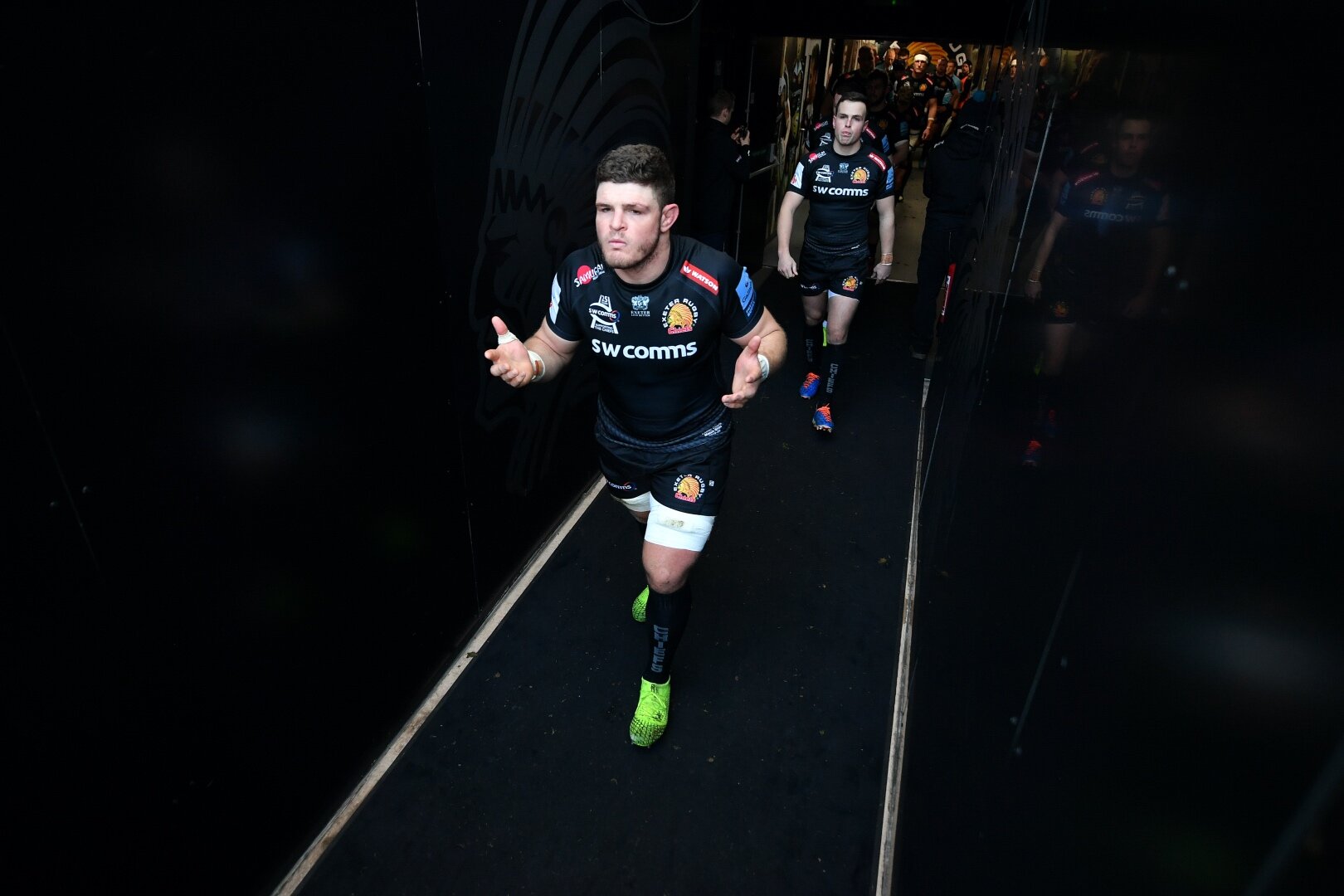'He's just a gainline monster... the props love him scrummaging on them because he gives flat out energy and weight at scrum time'

With all the Lions bolter speculation surrounding Sam Simmonds, you’d be forgiven if you thought the Exeter Chiefs back row was a one-man show heading into Saturday’s Heineken Champions Cup quarter-final at home to Leinster. Except it very much isn’t. Step forward Jacques Vermeulen and Dave Ewers, unsung heroes of the double-winning Exeter set-up.
It was 2019 when Vermeulen, the 26-year-old openside arrived from the Sharks having made his initial breakthrough at Western Province. As for English-qualified Ewers, the 30-year-old came to live in Devon as a teenager after his family abandoned their Zimbabwean farm under duress and he has since gone on to be a treasured part of the Exeter furniture this past decade.
Gainline monsters is how Rob Baxter refers to the pair, influence reflected in their most recent performance – the swatting aside of Lyon last weekend in the last 16 of Europe, a match where the Chiefs fell 14 points behind before storming back to lead at the interval and going on to win 47-25.
Any regular journalist at Baxter’s weekly media engagements would attest to how the Exeter coach is regularly peppered with queries surrounding Simmonds and his wilderness England years since 2018 despite his excellent club form.
It’s rare, though, to hear the Exeter boss dwell on what Vermeulen and Ewers bring to the party, an anomaly he rectified this week when he played up the attributes of the pair as they prepared for a no-holds-barred scrap with opposite Leinster numbers Josh van der Flier and Rhys Ruddock, opponents recently involved in the Ireland Guinness Six Nations set-up.
Sam Simmonds has scored 52 tries in 76 Test, Premiership and Champions Cup games compared to Billy Vunipola's 32 tries in 208…
– Yet Simmonds is playing on Saturday at Sandy Park while Vunipola runs out at Twickenham with England ?#SixNations #ENGvITAhttps://t.co/VjIpqY4UpY
— RugbyPass (@RugbyPass) February 13, 2021
Baxter can’t wait to witness what unfolds at Sandy Park. “Jacques is a really interesting one, a guy I like in that you can watch his game and go, ‘Oh, he is having some good impacts’. Particularly against Lyon, you saw him having a couple of real bursting carries out of defence and in attack so there is a speed element there, but when you are watching his game in detail, which is what we spend a lot of time doing here at the club, you see him just being an arrival at things that you just need.
“So the number of times say at a defensive breakdown he will just arrive first and will just win it. It might be a real scramble to hold onto the ball but he does. Same with an attacking breakdown, you might make a break and he is the first player in support and you secure the ball. Same on the kick chase, he might plug a hole because he just gets there.
“Some of our exit strategies he understands exactly what we are aiming to do. He gets other people organised and he kind of takes ownership of that part of what he needs to do. That is the thing, you don’t quite appreciate what he delivers until you look at the stuff that nobody really sees unless it is a standout carry or a standout tackle.
“And with Dave, he is just a gainline monster for us in probably every area of the game, in defence, attack, set-piece, maul, scrum. He aids our scrum, the props love him scrummaging on them because he gives flat out energy and weight at scrum time. Mauls, if he manages to get himself in one of the key positions towards the front it tends to be a good maul. And again he is a heavyweight carrier and gainline stopper.
“These guys are invaluable to us. Also, he has got some really good in-depth knowledge of our five-metre attack game. Great to see him starting to score some tries as well because often he is the guy who scores tries for everybody else by getting hold of them and carrying them across the try line, so that is his big strength and it’s good for him that he is starting to score some tries as well.
“They are different players but they complement each other fantastically well and then with Simmo (Sam Simmonds) in the middle, who adds really raw pace in attack and defence, you get a really good combination there that are really well backed up.
“Jannes Kirsten has also played very well for us this season both at lock and in the back row, Richard Capstick is starting to develop into a good young player, Don Armand is there or thereabouts most weeks within our back row, scrum selection and we haven’t even spoken about Sam Skinner because he is focusing more on the second row both internationally and club now but he played six in our semi-final against Toulouse last year and had a fantastic game.
“We have got some really good options and combinations we can put in the back five of the scrum, but those three guys are certainly doing the business at the moment.”
Being told he wouldn't make it as a scrumhalf was one of a number of incidents that motivated @ExeterChiefs Jack Maunder's career, but they've opened up a world beyond rugby and have resulted in a best selling book
– writes @heagneyl ???https://t.co/o65wxHHqFP
— RugbyPass (@RugbyPass) April 4, 2021





























